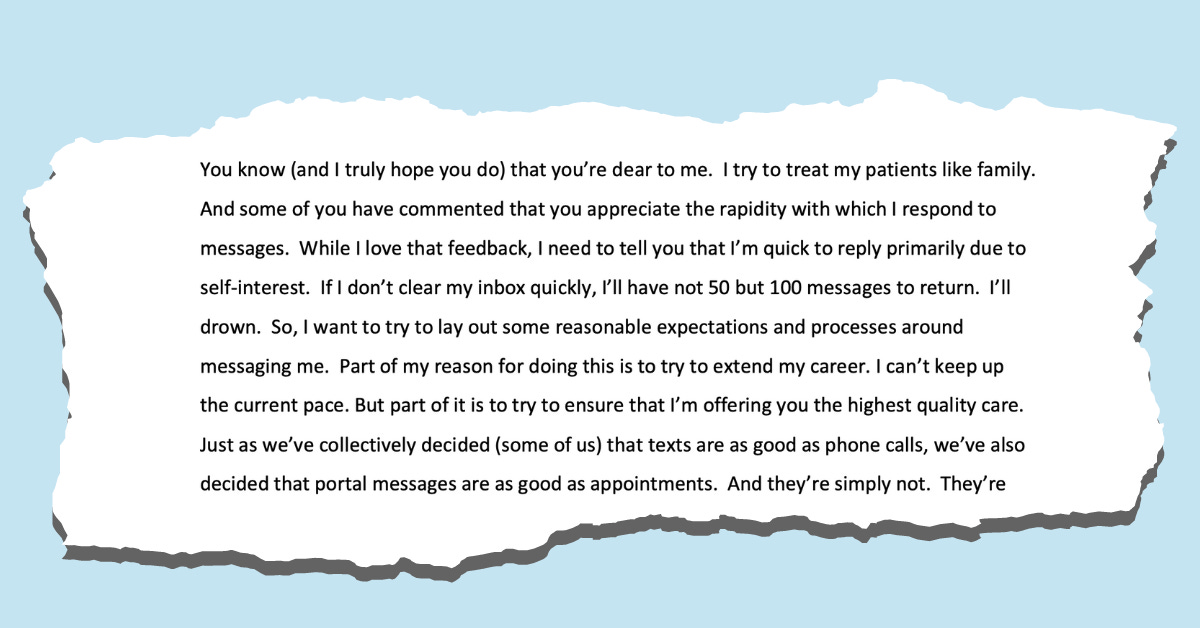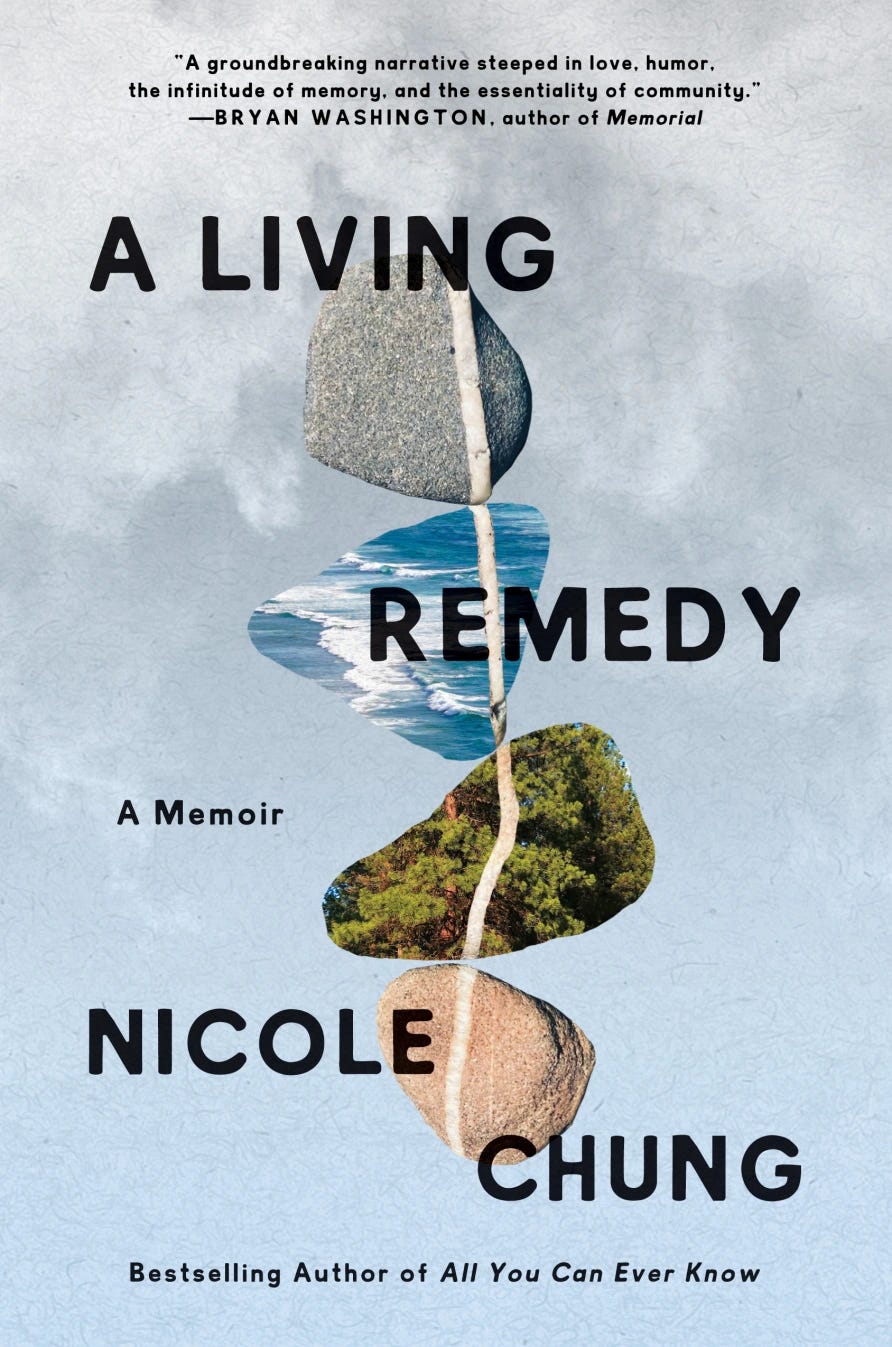Field Notes: How often should you get a colonoscopy? Is a cannabis crisis coming? How did one doctor halt the overwhelming patient portal messages? 📨
Plus, a compelling memoir + a poem + more
Hello, dear friends! I’m writing this the day before a colonoscopy, a not-fun-at-all (but important!) routine health screening. Dinner tonight is chicken broth, green Jell-O, and 32 ounces of prep liquid, plus more water and juice. I try to counter the unpleasantness by thinking about how fortunate I am to live in a time where doctors can screen for colon cancer and catch it early, to have health insurance to cover the expense, to have a kind and skilled GI doctor. Have you had a colonoscopy? The CDC Guidelines recommend a colonoscopy every 10 years for people ages 45 to 75 without any increased risk. It’s really not that bad — it’s not painful, more of an inconvenience than anything else. So if you haven’t been screened, maybe this is the universe’s nudge to ask your doctor about it? (As always, I’m not a physician and nothing in this newsletter is medical advice!)
That brings us to the first of this week’s Field Notes, six interesting things I’ve run across lately related to health.
1} Dr. Peter Attia on the importance of regular colonoscopies — This video clip and bullet-list summary details why Dr. Attia goes for a more aggressive approach to colonscopies, recommending screening starting at 40 and more often than every decade. Colon cancer is one of the deadliest of cancers, and it makes a big difference to catch it early. “I can’t tell you yet what the ideal frequency, but it’s much more frequently than what’s being done today” — he suggests something every 1 to 3 years or so would be better.
2} Death by Patient Portal (JAMA) — I appreciated this essay by Dr. Michael Stillman, a physician who (like so many many clinicians) was overwhelmed by the impossible number of daily patient portal messages and worried he might end up leaving medicine. He took an unconventional approach and wrote a heartfelt letter to his patients, confessing how he was feeling burned out. He asked for their help in limiting portal questions to urgent issues and saving complex queries for appointments. “Within a few hours of sending that message, I received more than 50 responses from patients (all with apologies for using the portal) assuring me that my requests were reasonable and that they would help take care of me as I had of them.” The letter also opened up a surprising conversation with colleagues and patients, some of whom talked to him later about their own overwhelm with the unsustainable number of daily work emails and messages. It reminded me about the power of sharing what you are going through — no one is a mind reader and people want to help.
3} This was my stunning read of the week: "Right now it's the opioid epidemic, but in a decade, it's going to be the cannabis crisis, and it's all going to be our kids." —Danielle Dick, a neuroscientist and Director of the Rutgers Addiction Research Center in an interview with Melinda Wenner Moyer. Dr. Dick explains: “The cannabis of today is a totally different drug than it was just a couple of decades ago. THC is the active ingredient. That's what gives it its psychoactive properties. And in the 70s, 80s, and 90s up through the early 2000s, the active level on average was about three percent THC. A very mild drug, if you will.” As legal growers began experimenting, they created stronger strains. “So we saw THC levels climb, to now, on average, about 25 percent. Eight times stronger than the marijuana of our youth. It is a completely different drug. And not only that, but edibles are 80 to 90 percent active THC.” Research on the long-term impact of this level hasn’t caught up yet with legalization, but for kids who are using cannabis regularly “it appears that there's pretty profound effects on memory and motivation. Those are the two big things that are affected. And when you think about what are kids’ jobs — to get themselves up to go to school, to get good grades — when your memory and motivation now are shot, you're not going to class, not doing well.” Dr. Dick continues: “The sad thing about the drug is because it affects motivation, you don't even care, either. So we find it very hard to treat these kids or get them to care about wanting to do better. This is why we are so worried.” Yikes! The Q&A, which also includes advice for parents talking to their kids about cannabis, is a useful read for all of us.
4} I read A Living Remedy by Nicole Chung on vacation last week. It’s a beautiful memoir of her parents’ illnesses and the complicated and beautiful child-parent connection, even as we grow into adults. I’ve scribbled down many quotes; here is one:
“How do you learn to cherish your life when grief has made it unrecognizable? I am starting to feel that we do so not by trying to fill a void that can never be filled but by living as best as we can in this strange yawning terrain our loved ones have left behind, exploring its jagged boundaries and learning to see it as something new. I believe this because I feel that I am becoming someone new—someone who can remember, and mourn, and live without punishing herself.”
5} Free subscriptions to Burnt Toast newsletter — I’ve been enjoying the delightful Burnt Toast newsletter by Virginia Sole-Smith, a journalist who writes about diet culture, fatphobia, parenting, and gardening and the author of Fat Talk. I appreciate her research-based, empathetic takes on how to navigate a world full of myths about fatness and separate out what is harmful cultural noise from what is important to notice for our health. As a paid subscriber, I have three 1-month free subscriptions to give out; if you would like one, send me an email at brianne@odysseyofthebody.com or reply in the comments. Virginia has many free posts, but her community Friday Threads (like this one: What Can Doctors Do Better for Fat Patients?) and her Ask Virginia posts (“I Told My Nephew My Weight Was a Secret.”) require a subscription.
6} Night MRI (JAMA) — This arresting poem by Carol Ellis, PhD ends:
then I am home and leaving
the bus my brain more or
less tangled from an MRI,
a constant banging, someone
trying to get in, someone
trying to get out, if they did,
who would that be, living
alone and screaming.
Rafael Campo writes an editor’s note analyzing the poem: “Poetry, especially that which responds to illness, because of its acute attention to detail and the physicality of its language, shows us what we can and cannot see in the world around us and in ourselves. So it is in ‘Night MRI,’ the poem acting as its own kind of technology of revelation. The speaker’s experience of having undergone an MRI is recapitulated in her bus ride home at night after the procedure, the inkiness of the scan evoked by the dark world through which she travels.”
Both are free to read, but you may need to sign up for an AMA account.
I hope you found something helpful or interesting in Field Notes this week. I’m off to drink more juice and dream about what I’ll get to eat tomorrow after the appointment. Hope you have a lovely weekend ahead.
To our journeys,
Brianne






The article on cannabis couldn't be more timely for me -- my state will have legalized weed in three days and I know I need to start having some different kinds of conversations about pot/edibles with my kids than we've had so far. Ahhhhhhh!!